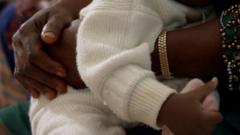Chioma is convinced that the baby boy she cradles, named Hope, is her biological son—a seemingly miraculous outcome after eight years of unsuccessful attempts to conceive. In a tense meeting with Anambra state's commissioner for women affairs, Ify Obinabo, Chioma and her husband Ike defend their claims of parenthood against skepticism from Ike's family. Chioma asserts she “carried” the child for around 15 months, a notion that baffles the authorities present.
Desperate measures have led some women to seek out quack clinics that exploit their desire for motherhood through a scheme known as “cryptic pregnancy.” This scam preys on hopeful mothers, offering supposed treatments that falsely promise fertility and manipulate women into believing they are pregnant when no actual conception has occurred. After experiencing immense pressure from her family to have a child, Chioma fell victim to one such clinic that misled her about her condition.
Undercover investigations into these fraudulent clinics revealed a web of deceit driven by individuals posing as medical professionals. The women are sold an array of treatments—substances that lead them to believe they are really pregnant. As sensationalized claims of miraculous results are touted by con artists, women are often forbidden from consulting real medical professionals, further trapping them in the scam.
These fraudulent activities have not gone unnoticed; authorities are increasingly determined to curb such schemes. However, the societal stigma surrounding childlessness in Nigeria complicates the issue, as women are often marginalized and pressured into extreme actions. Recent raids on questionable facilities have unveiled horrifying conditions, including women being trafficked and coerced into giving up their newborns.
The investigation further discovered that misinformation about pregnancy, shared in social media groups, fosters a conducive environment for these scams. Beliefs in miraculous pregnancies are exploited by scammers reaching across borders, indicating a broader issue of disinformation affecting vulnerable women globally.
While Chioma ultimately managed to retain custody of Hope through her plea, the inquiry highlights the ongoing struggle for women regarding reproductive rights in Nigeria. Experts warn that without a societal shift regarding these issues, the dangerous sprawl of such deceptive practices will likely persist. Authorities are urged to deepen their understanding and strategy to fight these attacks on women's rights in a climate often filled with misinformation and desperation.




















